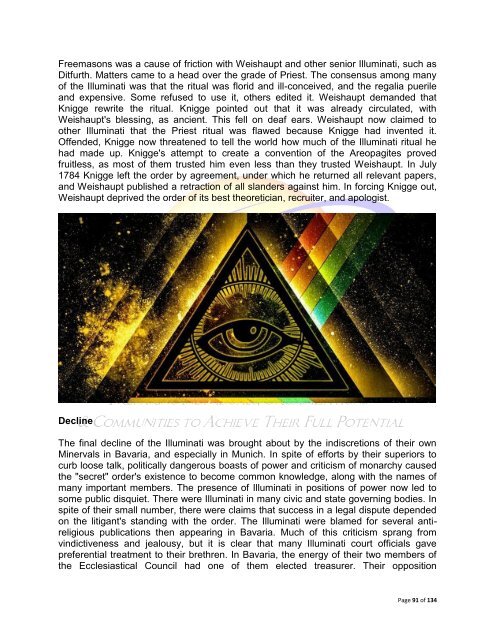Cultural Transformation
Cultural Transformation
Cultural Transformation
Create successful ePaper yourself
Turn your PDF publications into a flip-book with our unique Google optimized e-Paper software.
Freemasons was a cause of friction with Weishaupt and other senior Illuminati, such as<br />
Ditfurth. Matters came to a head over the grade of Priest. The consensus among many<br />
of the Illuminati was that the ritual was florid and ill-conceived, and the regalia puerile<br />
and expensive. Some refused to use it, others edited it. Weishaupt demanded that<br />
Knigge rewrite the ritual. Knigge pointed out that it was already circulated, with<br />
Weishaupt's blessing, as ancient. This fell on deaf ears. Weishaupt now claimed to<br />
other Illuminati that the Priest ritual was flawed because Knigge had invented it.<br />
Offended, Knigge now threatened to tell the world how much of the Illuminati ritual he<br />
had made up. Knigge's attempt to create a convention of the Areopagites proved<br />
fruitless, as most of them trusted him even less than they trusted Weishaupt. In July<br />
1784 Knigge left the order by agreement, under which he returned all relevant papers,<br />
and Weishaupt published a retraction of all slanders against him. In forcing Knigge out,<br />
Weishaupt deprived the order of its best theoretician, recruiter, and apologist.<br />
Decline<br />
The final decline of the Illuminati was brought about by the indiscretions of their own<br />
Minervals in Bavaria, and especially in Munich. In spite of efforts by their superiors to<br />
curb loose talk, politically dangerous boasts of power and criticism of monarchy caused<br />
the "secret" order's existence to become common knowledge, along with the names of<br />
many important members. The presence of Illuminati in positions of power now led to<br />
some public disquiet. There were Illuminati in many civic and state governing bodies. In<br />
spite of their small number, there were claims that success in a legal dispute depended<br />
on the litigant's standing with the order. The Illuminati were blamed for several antireligious<br />
publications then appearing in Bavaria. Much of this criticism sprang from<br />
vindictiveness and jealousy, but it is clear that many Illuminati court officials gave<br />
preferential treatment to their brethren. In Bavaria, the energy of their two members of<br />
the Ecclesiastical Council had one of them elected treasurer. Their opposition<br />
Page 91 of 134

















